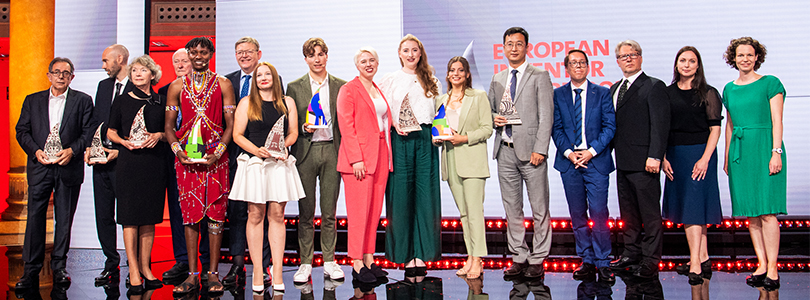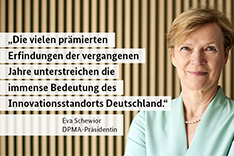Content
European Inventor Award 2023: DPMA President congratulates the winners

Converting waste into renewable fuels, building safe car batteries and efficiently storing hydrogen - DPMA President Eva Schewior: European Inventor Award shows breadth of European innovative strength and highlights importance of Germany as innovation location
Munich. The President of the German Patent and Trade Mark Office (DPMA), Eva Schewior, warmly congratulates all winners and nominees of the European Inventor Award 2023. "The European Inventor Award once again highlights the full range of European innovative strength," said the DPMA President. "My special congratulations to all award winners! But the other nominees have also achieved outstanding things." In particular, Schewior highlighted the achievements of German inventors in recent years. "The many award-winning and nominated inventions of the past years show how strongly German inventors contribute to the European innovation scene and underline the immense importance of Germany as a location for innovation."
In the past 17 years, some 40 finalists and 17 winners of the European Inventor Award had German roots.
The prize, which has been awarded by the ![]() European Patent Office (EPO) since 2006, was presented today in Valencia, Spain. The award ceremony was broadcast online as a livestream. As usual, the EPO presented the award in five categories and awarded an audience prize.
European Patent Office (EPO) since 2006, was presented today in Valencia, Spain. The award ceremony was broadcast online as a livestream. As usual, the EPO presented the award in five categories and awarded an audience prize.
The award winners
This year's winners of the European Inventor Award were chosen from over 600 candidates proposed from around the world. The finalists represent 12 countries: Australia, Austria, Belgium, China, Finland, France, Germany, Iceland, India, Ireland, Italy and the United States. Many of their innovations aim to improve the everyday lives of people around the world and tackle society’s biggest challenges, such as environmental issues or the energy transition.
The laureates are:
Industry:
Non-EPO countries
Chinese inventor Kai Wu and team for lowering the risk of car explosions caused by lithium-ion batteries. Wu’s team developed a safety short circuit device (SSD), a protection device integrated into the battery. When triggered, the invention would stop the battery charging, thus eliminating the risk of battery failure caused by overcharging.
Research
The French team of Patricia de Rango, Daniel Fruchart, Albin Chaise, Michel Jehan and Nataliya Skryabina for finding a safe and efficient way to store hydrogen. The team developed an atomic structure and process that results in safer, sustainable and more stable hydrogen storage.
SMEs
Irish physicists Rhona Togher and Eimear O'Carroll invented a new material for preventing ear damage caused by noise. Their responsive material works to dampen sound, reducing noise transmission from one space to another. It can be integrated into household appliances and can be used also in the automotive, construction and aerospace industries.
Lifetime Achievement
The Spanish chemist, Avelino Corma Canós is a widely acclaimed pioneer in the field of catalysts. His legacy, however, is the Instituto de Tecnología Química (ITQ, UPV-CSIC), an institution he co-founded to drive chemistry research in energy, sustainability, health and water.
Young Inventors Prize
Launched in 2022 this prize recognises the initiative and creativity of young people. The winner receives EUR 20 000. The second and third placed finalists receive EUR 10 000 and EUR 5 000 respectively.
First place: Richard Turere is a 22-year-old Maasai inventor from Kenya who was deeply concerned with protecting his family’s livestock without endangering the local lion population. To address this issue, he developed Lion Lights™, a system that uses light sequences to deter lions and other predators from approaching livestock. It has been successfully adopted in multiple countries in Africa as well as in India and Latin America to deter various animals.
Second place: Filipa de Sousa Rocha, a 27-year-old Portuguese computer engineer and researcher, is dedicated to enhancing digital learning for visually impaired children. Her invention allows children to send commands to a robot using directional movements or speech functions similar to playing a drag-and-drop computer game.
Third place: Fionn Ferreira, a 22-year-old Irish inventor, whose passion for ocean conservation led him to uncover a solution for microplastic removal from water sources. He developed a unique magnetic liquid solution to eliminate microplastics from water. By binding to microplastic particles, his liquid allows for their separation from water sources, helping combat one of the world’s most pressing ecological challenges.
Popular Prize
Chosen by the public, this year’s winner is the French research team of Patricia de Rango, Daniel Fruchart, Albin Chaise, Michel Jehan and Nataliya Skryabina, who also won in the ‘Research’ category for their hydrogen storage solution.
Bild 1: EPA, Bild 2: DPMA
Last updated: 23 January 2024


Social Media